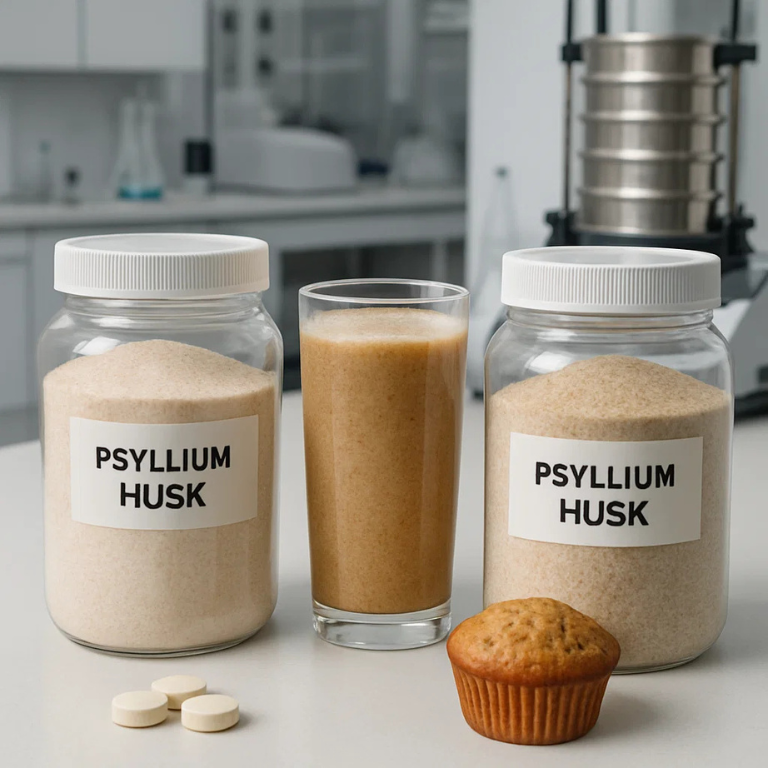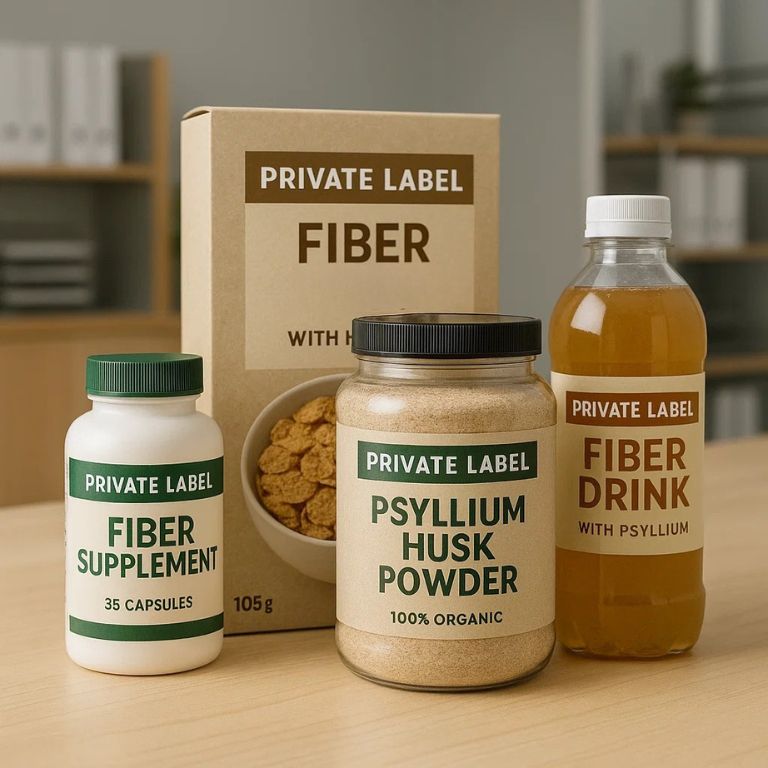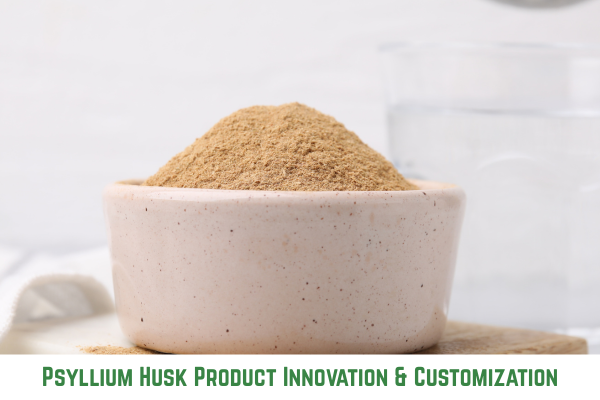Table of Contents
Psyllium husk powder has seen a rise in demand across various industries, particularly in food, supplements, and health and wellness products. As its popularity grows, manufacturers and brands are increasingly looking for ways to innovate and customize psyllium husk powder to meet specific product requirements. From mesh size and customized blends to the decision between sterilized and non-sterilized options, understanding these factors is key to creating high-quality, functional products. This article delves into the essential aspects of psyllium husk product innovation and customization, offering insights for B2B buyers on how to choose the right psyllium husk powder and make the most of market trends.
How Does Mesh Size Impact the Quality and Application of Psyllium Husk Powder?
- Fine Mesh Psyllium Husk Powder: A finer mesh size is often preferred for use in supplements, functional foods, and beverages as it easily dissolves and integrates into liquids. This mesh size provides a smooth texture, ideal for products like smoothies, shakes, or capsules where the powder should not clump or leave any gritty residue.
- Coarser Mesh Psyllium Husk Powder: On the other hand, a coarser mesh size is more commonly used in baking or as a thickening agent, where a bit of texture and structure is needed in the final product. This size is suitable for applications like gluten-free baking, where the psyllium husk needs to bind ingredients together and help the product retain moisture and elasticity.

Choosing the right mesh size ensures that the psyllium husk powder works effectively in the specific product you are developing. For functional foods, powders with smaller mesh sizes are generally preferred for ease of incorporation, while products that benefit from the thickening and binding properties of psyllium may opt for larger mesh sizes.
What Are Customized Psyllium Husk Powder Blends for Functional Food Brands?
As the demand for functional foods continues to rise, many food manufacturers are opting for customized psyllium husk powder blends tailored to their specific nutritional needs. Customized blends allow brands to create unique formulations that meet the dietary requirements of their target audience.
- Blends for Digestive Health: Customized psyllium husk blends can be enriched with additional fibers or prebiotics to support gut health. For example, combining psyllium with inulin, fructooligosaccharides (FOS), or other soluble fibers enhances its digestive benefits, making it an ideal ingredient for digestive health products, probiotics, or colon cleanse formulas.
- Blends for Weight Management: For weight management products, psyllium can be combined with appetite-suppressing ingredients like Garcinia Cambogia or green tea extract. Psyllium husk is already known for its ability to increase satiety by expanding in the stomach, and combining it with other ingredients can provide a comprehensive solution for consumers seeking weight-loss or meal-replacement products
- Blends for Gluten-Free and Keto Diets: Customized psyllium blends can also cater to the growing gluten-free and keto food markets. For instance, psyllium husk powder can be combined with almond flour or coconut flour to create low-carb, gluten-free baking mixes that are high in fiber and ideal for those following these specific diets.
Sterilized vs Non-Sterilized Psyllium Powder: What Do B2B Buyers Need to Know?
- Sterilized Psyllium Husk Powder: Sterilization involves treating the psyllium powder to eliminate any potential pathogens, bacteria, or fungi, which is particularly important for food and pharmaceutical applications. Sterilized psyllium is commonly used in dietary supplements, functional foods, and beverages that require a higher standard of cleanliness and safety. It ensures that the end product is free from contaminants, making it suitable for sensitive applications where consumer health and safety are top priorities.
- Non-Sterilized Psyllium Husk Powder: Non-sterilized psyllium husk powder is less expensive and may be preferred in applications where microbial contamination is not a significant concern, such as in certain industrial or non-consumable products. However, it is generally not recommended for food and supplements that require long shelf life and strict hygiene standards. Non-sterilized psyllium can still offer high quality and effectiveness in applications such as animal feed, adhesives, and textile industries.
Why is Private Label Psyllium Becoming a Growing Trend Among Health & Wellness Retailers?

- Brand Control and Customization: Private labeling allows retailers to have greater control over the product, from formulation to packaging, while customizing the product to meet the specific preferences of their target audience. Health and wellness retailers often leverage private-label psyllium husk powder to create supplements, fiber-enriched foods, and beverages that align with their brand’s values and customer needs.
- Cost Efficiency: Private-label psyllium powder allows retailers to reduce costs by bypassing the need to develop a completely new product from scratch. Instead, they can source high-quality psyllium powder from established suppliers and focus on marketing and branding, which gives them a competitive edge in the growing health-conscious market
- Consumer Trust: Offering private-label products gives retailers the opportunity to build consumer trust by providing high-quality, transparent ingredients. Retailers can highlight the benefits of psyllium husk powder, such as promoting digestive health, supporting weight management, or adding fiber to daily diets, aligning with the growing consumer interest in natural and functional products.
Why Do B2B Buyers Prefer Contract-Manufactured Psyllium-Based Supplements?
- Expertise and Efficiency: Contract manufacturers have the expertise and infrastructure to produce psyllium-based supplements at scale, ensuring consistent quality and efficiency. They are familiar with the complexities involved in formulating supplements that meet both regulatory standards and consumer expectations, which minimizes the risks associated with in-house manufacturing.
- Cost-Effectiveness: Contract manufacturing reduces overhead costs associated with production, allowing businesses to invest more in product development and marketing. For companies looking to offer psyllium-based products, partnering with a contract manufacturer helps streamline the production process and maintain profitability.
- Regulatory Compliance and Quality Control: Contract manufacturers are well-versed in the regulatory requirements of the health supplement industry, including GMP (Good Manufacturing Practices) and safety standards. This ensures that psyllium-based supplements are produced to the highest standards and meet all necessary regulatory guidelines, which is critical for gaining consumer trust and maintaining brand reputation.
- Flexibility and Customization: Working with a contract manufacturer allows B2B buyers to customize psyllium-based supplements to meet specific market needs, such as developing unique blends for weight management, digestive health, or gluten-free diets. Contract manufacturers often offer flexibility in product formats, including capsules, powders, or gummies, enabling businesses to create a diverse product range.



